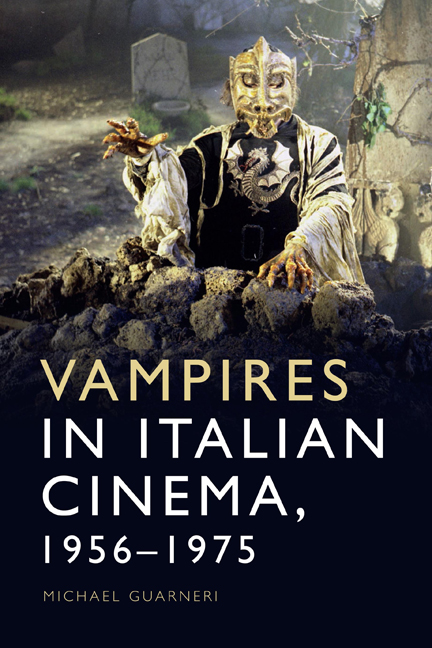Book contents
- Frontmatter
- Contents
- Figures and tables
- Acknowledgements
- Introduction
- PART I THE INDUSTRIAL CONTEXT
- PART II VAMPIRE SEX AND VAMPIRE GENDER
- PART III SANGUINE ECONOMY, BLOODY POLITIC
- Appendix A Three Italian vampire films that were never made
- Appendix B Files from the Italian Show Business Bureau fonds at the Archivio Centrale dello Stato in Rome
- Bibliography
- Index
5 - Vampires of the late 1950s and early 1960s
Published online by Cambridge University Press: 10 October 2020
- Frontmatter
- Contents
- Figures and tables
- Acknowledgements
- Introduction
- PART I THE INDUSTRIAL CONTEXT
- PART II VAMPIRE SEX AND VAMPIRE GENDER
- PART III SANGUINE ECONOMY, BLOODY POLITIC
- Appendix A Three Italian vampire films that were never made
- Appendix B Files from the Italian Show Business Bureau fonds at the Archivio Centrale dello Stato in Rome
- Bibliography
- Index
Summary
FROM RECONSTRUCTION TO THE ‘BOOM’
In this chapter and the next one, the ‘unmasking of cultural artifacts as socially symbolic acts’ (Jameson [1981] 2002: 5) that constitutes the aim of the monograph proceeds with an analysis of the socio-economic and political implications of 1956–1975 Italian vampire cinema. Here, the theoretical points of reference are the scholars of literature and film mentioned in the Introduction, who – reworking Marx's ([1867] 1954: 224–85) indictment of the nineteenth-century European bourgeoisie as vampiric – have investigated the dynamics of class and imperialistic struggle in the vampire narratives of the Anglo-American tradition and in Murnau's Nosferatu, exposing vampires as socio-economic leeches and/or political oppressors. As we shall see, many Italian vampire movies also identify bloodsucking figures with enemies within (a specific group of people in the nation-state's social body) and/or enemies without (scheming foreigners), essentially adapting Marxian and Marxist invectives to the post-war Italian zeitgeist, from the dawn of the economic miracle in the late 1950s to mid-1970s austerity. However, direct references to the œuvres of Marx and Marxist thinkers are absent from the Italian vampire movies of the late 1950s and early 1960s, and extremely rare in Italian cinema as a whole until the second half of the 1960s, when the Christian Democrats’ anti-Communism began to loosen up, at least in the Italian Show Business Bureau (the Italian Socialist Party officially entered the government coalition in December 1963) and in the Italian Film Censorship Office (whose jurisdiction was limited exclusively to matters of public decency by law 161 of 21 April 1962). The distinction between this chapter and the next one is thus chronological: the former is devoted to the somewhat oblique vampire metaphors of the late 1950s and early 1960s, while the latter concerns itself with the explicitly politicised vampires of the first half of the 1970s.
Putting forward political and socio-economic readings of the vampire film output of the late 1950s and early 1960s first of all requires a work of contextual analysis detailing the causes and consequences of the 1958–1963 economic miracle. As in the previous two chapters’ exploration of gender issues, the starting point is the reconstruction period. From the immediate post-war until well into the second half of the 1950s, Italy was an underdeveloped country.
- Type
- Chapter
- Information
- Vampires in Italian Cinema, 1956-1975 , pp. 127 - 148Publisher: Edinburgh University PressPrint publication year: 2020



